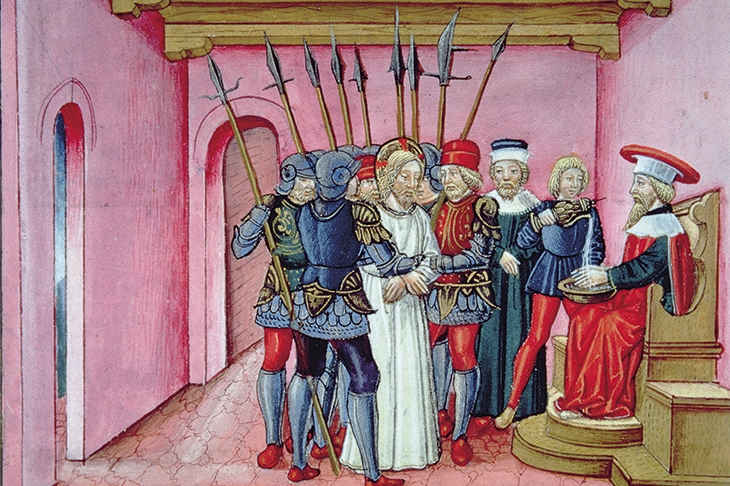In 1866, the Russian historian Alexander Popov made an astonishing discovery. Leafing through a Renaissance Slavonic translation of the first-century Jewish historian Josephus, Popov found detailed notes on the trial of Jesus written by none other than Pontius Pilate, the Roman governor who sentenced Jesus to death. The notes, finally published in a German edition 60 years later, were impressively detailed. They described Jesus as a ‘crooked’ and ‘horse-faced’ man whose eyebrows met over his nose. They showed how he had arrived in Jerusalem in the week before his death in the company of secretly armed partisans, intending to occupy the Temple. And they proved that Pilate had been forced to act to keep the peace. The sentence he passed was lawful. Jesus was guilty, Pilate innocent.
The notes were, of course, a fabrication and they fooled few, but their declaration of Pilate’s innocence was no innovation, being part a longstanding tradition. David Lloyd Dusenbury’s The Innocence of Pontius Pilate is, in the first instance, a forensic study of that tradition. The book traces numerous readings of the trial from its canonical origins in the gospels, and highlights the various attempts to get Pilate off the hook. The best known of these are the Christian ones, motivated by the twin desires to exonerate Rome and (further) impugn the Jews. An innocent Pilate suited those who wanted to curry favour with the authorities (in the early centuries) or demonise society’s outsiders (in the later ones).
One retelling of the trial claims that it was Herod, not Pilate, who acted as Jesus’s judge
Pilate is also pardoned, however, in many other traditions. Pagan intellectuals remembered, or rather reinvented, him as an innocent man and a just judge. A now lost Acts of Pilate forcefully made the governor’s case and was apparently taught by Roman schoolmasters, at least according to the historian Eusebius.







Comments
Join the debate for just £1 a month
Be part of the conversation with other Spectator readers by getting your first three months for £3.
UNLOCK ACCESS Just £1 a monthAlready a subscriber? Log in